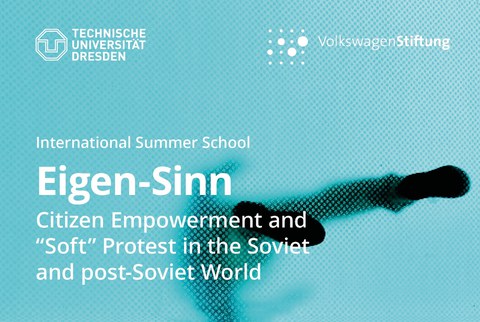Apr 23, 2022
Eigen-Sinn: Citizen Empowerment and “Soft” Protest in the Soviet and Post-Soviet World
Participation
About the Summer School
Program
Downloads
Participation
The summer school lasts from May 2 to May 7, 2022. The events will take place in a hybrid format – in presence in DHMD and online.
For our participants who cannot attend our program in person and for our audience, we will broadcast our lectures and workshops by Zoom.
|
You can participate online in all events spontaneously by accessing the following Zoom-Link: https://tu-dresden.zoom.us/j/85183844860?pwd=WjJTMitWZnFCNi91OVgrR09OSG5VUT09 Meeting-ID: 851 8384 4860 |
About the Summer School
The summer school is to be the first major event in Germany offering a balanced, interdisci-plinary, historically well-founded discussion of practices of disobedience and/or deviation from the reigning politics in Russia, bringing together young and established scholars from different countries and academic backgrounds.
Even in the countries with a harsh system of state surveillance, as in today’s Russia, there is still space for individual freedom and for a rather consistent resistance to power. This space can be found by considering not only textbook approaches to political agency of citizens, the paradigmatic examples of which would be participation in elections and protest demonst-rations, but also diverse opportunities of other, more local and less spectacular ways of dissident dealing with power.
The choice of the topic for our summer school reacts to the recently growing number of studies dealing with the relationship between power and people, state system and individual in the context of political non-freedom. We update and contextualize the notion of “Eigen-Sinn“, a term coined by the German historians Alf Lüdtke and Thomas Lindenberger at the beginning of the 1990s, in order to describe and investigate multifaceted, often non-confrontative practices and patterns of resistance in Russia from the late Soviet era to the present. It draws on the polysemous meaning of the German expression, meaning both stubbornness/obstinacy (that is, opposition to certain rules or demands), and one’s own/innate sense/meaning (that is, the creation of a meaningful attitude to life, especially in adverse political conditions). The concept allows for an interdisciplinary approach to the issue of civil resistance in different contexts and from different perspectives of sociology, political science as well as cultural and literary studies.
Program
The whole program of our summer school you can find on the website here.

